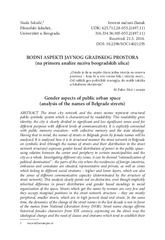Приказ основних података о документу
Rodni aspekti javnog gradskog prostora (na primeru analize naziva beogradskih ulica)
Gender aspects of public urban space (analysis of the names of Belgrade streets)
| dc.creator | Sekulić, Nada | |
| dc.date.accessioned | 2021-10-12T11:55:39Z | |
| dc.date.available | 2021-10-12T11:55:39Z | |
| dc.date.issued | 2014 | |
| dc.identifier.issn | 0038-0318 | |
| dc.identifier.uri | http://reff.f.bg.ac.rs/handle/123456789/1787 | |
| dc.description.abstract | Ulična mreža grada i nazivi ulica predstavljaju strukturalni javni simbolički sistem koji karakteriše čitljivost. Ona gradu daje identitet, jasno je podeljena u značajnije i manje značajne zone različite namene i stepena komunikativnosti i eksplicitno je povezana sa javnim evociranjem memorije - sa kolektivnim sećanjem i državnom ideologijom. Polazeći od toga, ovde su analizirani nazivi ulica u Beogradu dobijeni po imenima žena. Analizirano je kako u strukturalnom smislu ulična mreža Beograda na simboličkoj ravni (kroz nazive ulica i njihovu distribuciju u strukturi ulične mreže) izražava rodnu raspodelu moći u javnom prostoru - kroz odnos centra i periferije opština i grada u celini, kroz analizu različitih gradskih zona kroz koje se može pratiti 'racionalizacija političke dominacije' - delovi grada u kojem su locirane rezidencije stranih zemalja, ambasade i konzulati reprezentativne i privatne, kao i zona koje pripadaju različitim socijalnim stratumima - višim i nižim slojevima, kao i kroz analizu zona različitog komunikativnog kapaciteta (određenih strukturom ulične mreže). Ova analiza jasno ukazuje na distinktivne, mada implicitno ugrađene razlike u distribuciji moći i ugleda u socijalnoj organizaciji prostora na rodnoj osnovi. Ulica koje su dobile imena po ženama ima veoma malo i zauzimaju marginalne položaje u strukturi ulične mreže - to su mahom periferne, manje ulice, koje su u znatnom procentu čak slepe. Istovremeno, dinamika promena naziva ulica u poslednjoj deceniji vodila je defavorizovanju imena iz NOB-a i afirmisanju istorijskih likova žena iz XIX veka, izražavajući kroz to na direktan način promenu ideologije i potrebu klasa i slojeva koji danas nastoje da učvrste svoj društveni položaj i uticaj za promenom slike o istoriji u funkciji sopstvenog legitimizovanja. | sr |
| dc.description.abstract | The street city network and the street names represent structural public symbolic system which is characterized by readability. This readability gives identity; the city is clearly divided in significant and less significant zones used for different purposes with different levels of communicativity. It is explicitly connected with public memory evocation- with collective memory and the state ideology. Having that in mind, the names of streets in Belgrade given by female names will be analyzed. It is analyzed how it is in structural manner the street network in Belgrade on symbolic level (through the names of streets and their distribution in the street network structure) expresses gender based distribution of power in the public space- using relation between the center and periphery in certain municipalities and the city as a whole. Investigating different city zones, it can be showed 'rationalization of political domination' - the parts of the city where the residencies of foreign countries, embassies and consulates are situated, representative and private, as well as zones which belong to different social stratums - higher and lower layers, which are also the zones of different communicative capacity (determinated by the structure of street network). This analysis clearly points out on distinctive, even though implicitly inherited difference in power distribution and gender based standings in social organization of the space. Streets which got the name by women are very few and they occupy marginal positions in the street network structure - they are mostly peripheral, smaller streets, which are in high percent dead end streets. In the same time, the dynamics of the change of the street names in the last decade is not in favor of the names from National Liberation Army (NOB). Street name change affirms historical females characters from XIX century, expressing on the direct way the ideological change and the need of classes and stratums which tend to establish their social position today and their influence on the changing the view on history in order to consolidate their own legitimization. | en |
| dc.publisher | Sociološko udruženje Srbije i Crne Gore, Beograd i Univerzitet u Beogradu - Filozofski fakultet - Institut za sociološka istraživanja, Beograd | |
| dc.rights | openAccess | |
| dc.rights.uri | https://creativecommons.org/licenses/by-nc/4.0/ | |
| dc.source | Sociologija | |
| dc.subject | ulična mreža kao strukturalni javni simbolički sistem | sr |
| dc.subject | sociologija prostora | sr |
| dc.subject | nazivi ulica u Beogradu po imenima žena | sr |
| dc.subject | distribucija moći na rodnoj osnovi | sr |
| dc.subject | the street names in Belgrade by female names | en |
| dc.subject | street network as structural public symbolic system | en |
| dc.subject | sociology of the space | en |
| dc.subject | gender based power distribution | en |
| dc.title | Rodni aspekti javnog gradskog prostora (na primeru analize naziva beogradskih ulica) | sr |
| dc.title | Gender aspects of public urban space (analysis of the names of Belgrade streets) | en |
| dc.type | article | |
| dc.rights.license | BY-NC | |
| dc.citation.epage | 144 | |
| dc.citation.issue | 2 | |
| dc.citation.other | 56(2): 125-144 | |
| dc.citation.rank | M24 | |
| dc.citation.spage | 125 | |
| dc.citation.volume | 56 | |
| dc.identifier.doi | 10.2298/SOC1402125S | |
| dc.identifier.fulltext | http://reff.f.bg.ac.rs/bitstream/id/650/1784.pdf | |
| dc.identifier.scopus | 2-s2.0-84904362312 | |
| dc.type.version | publishedVersion |

